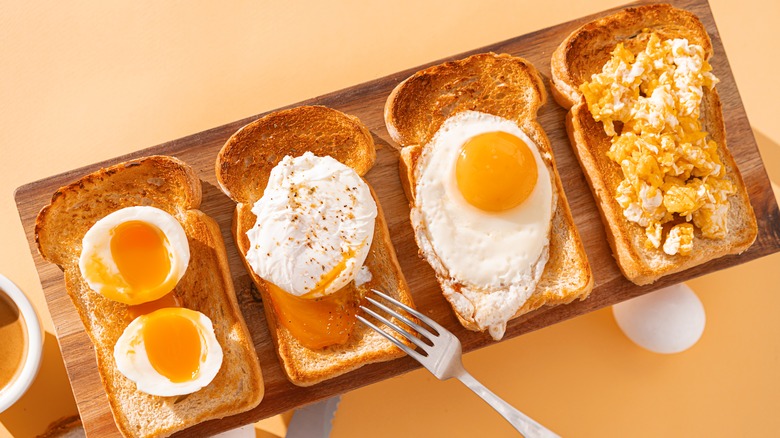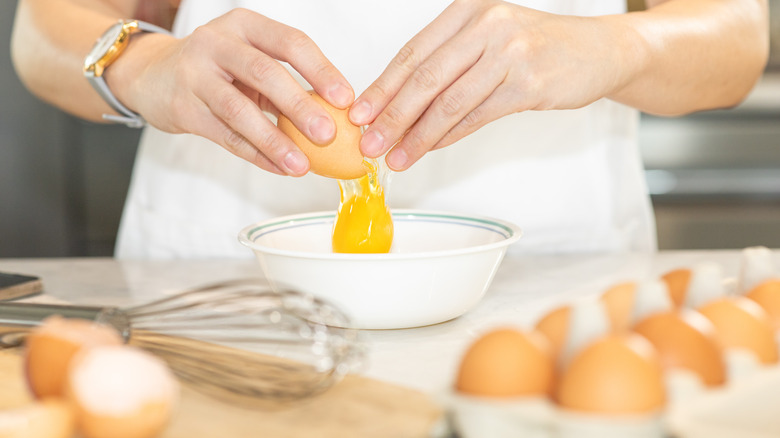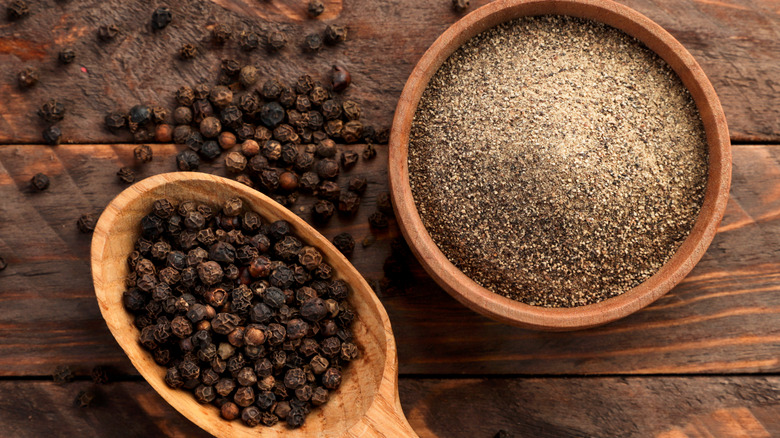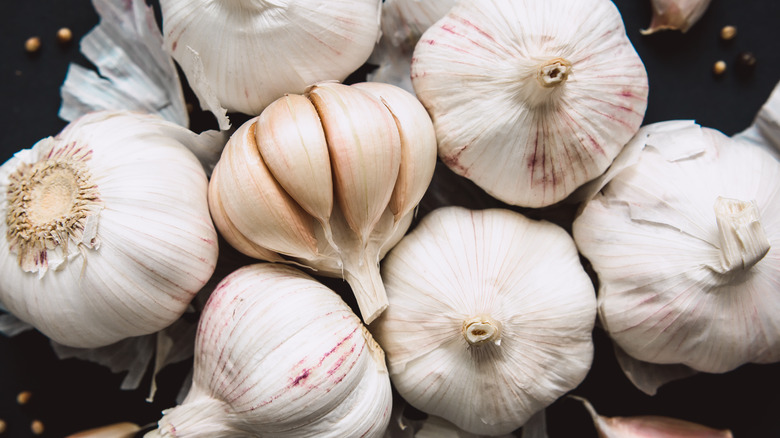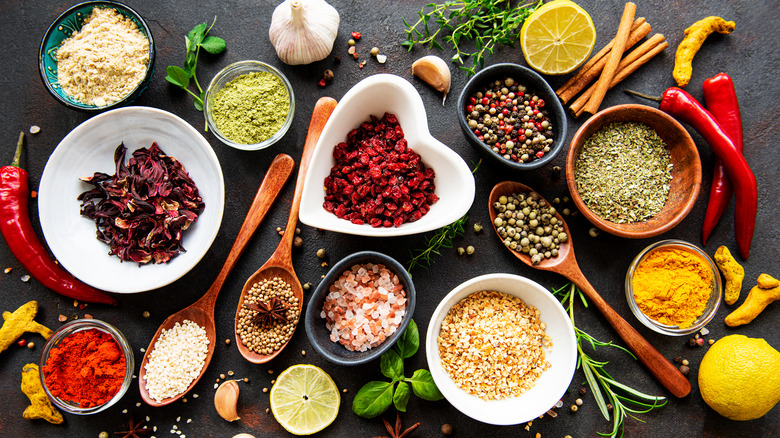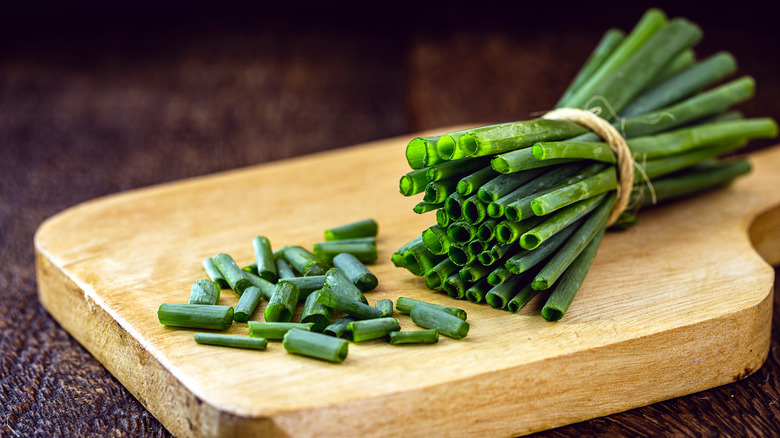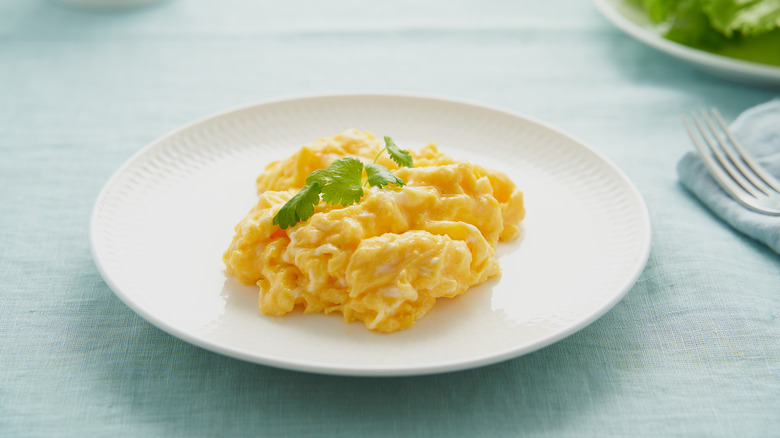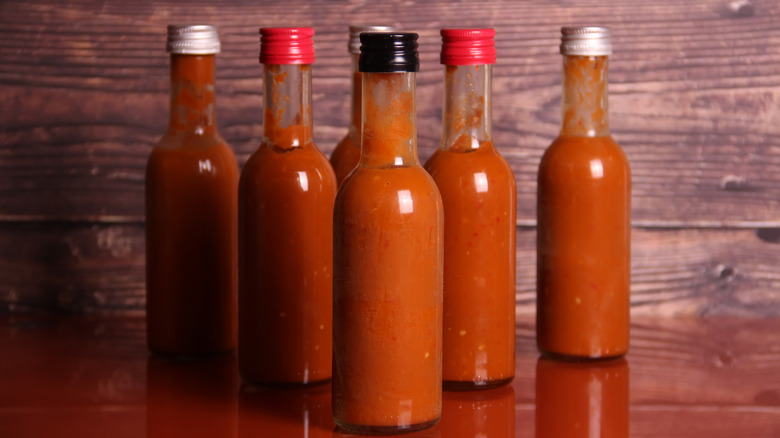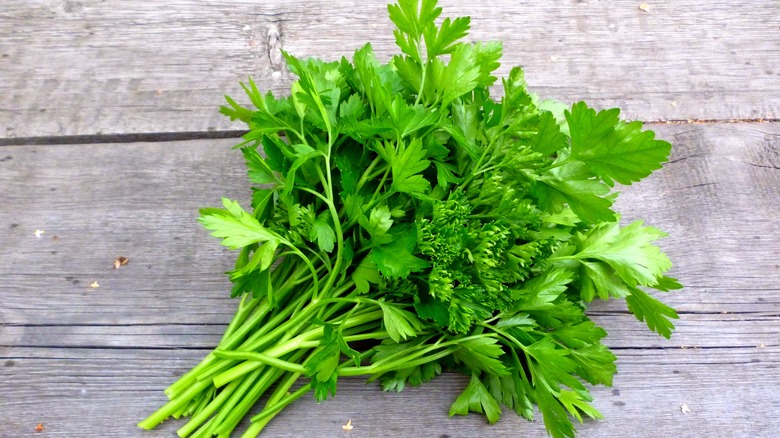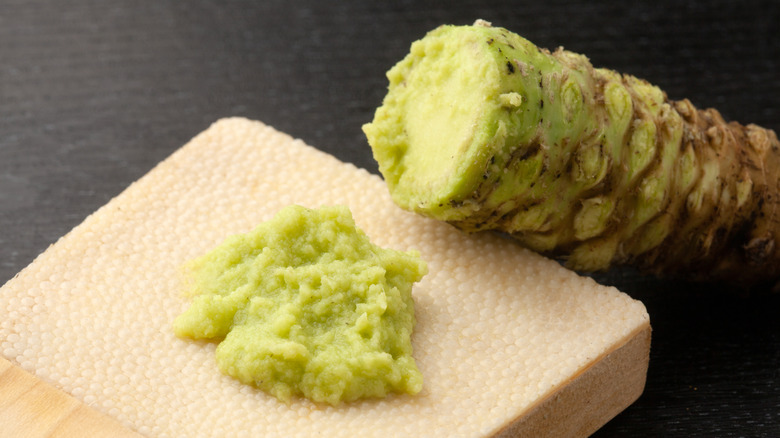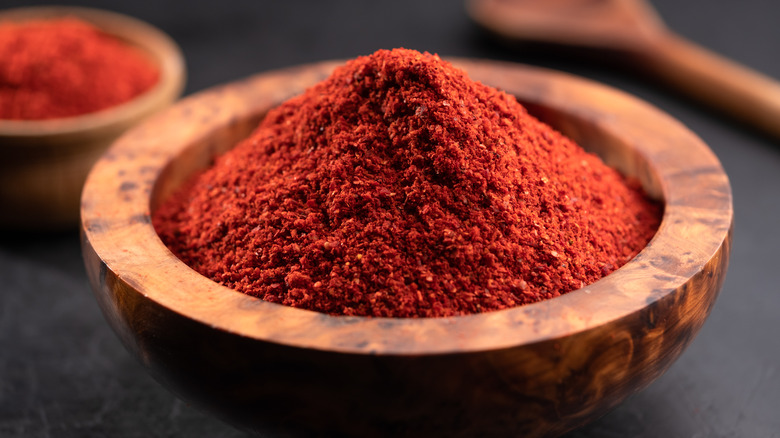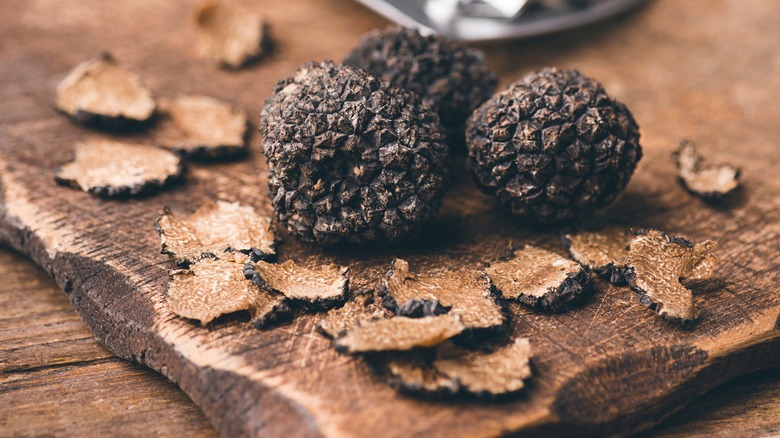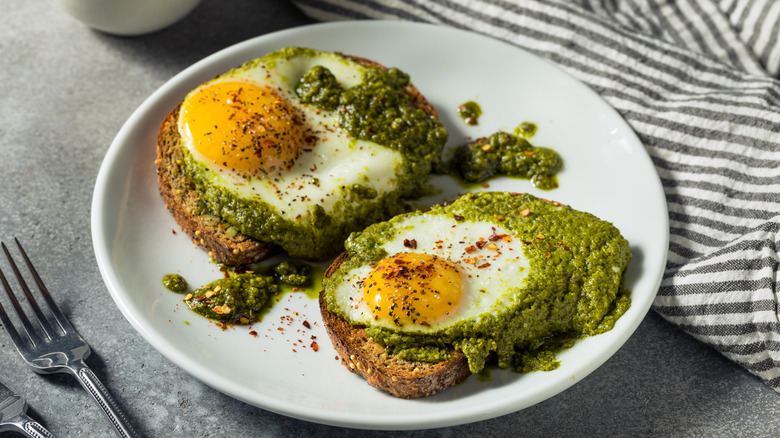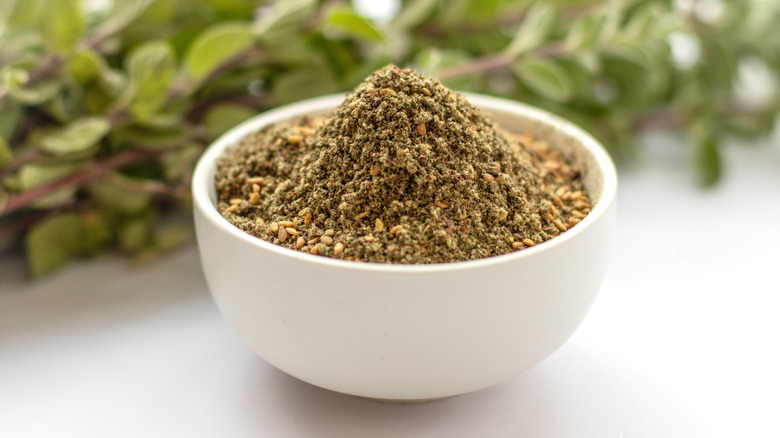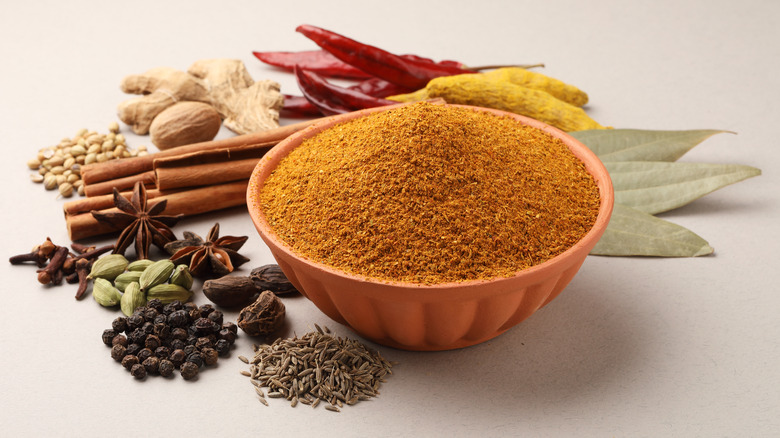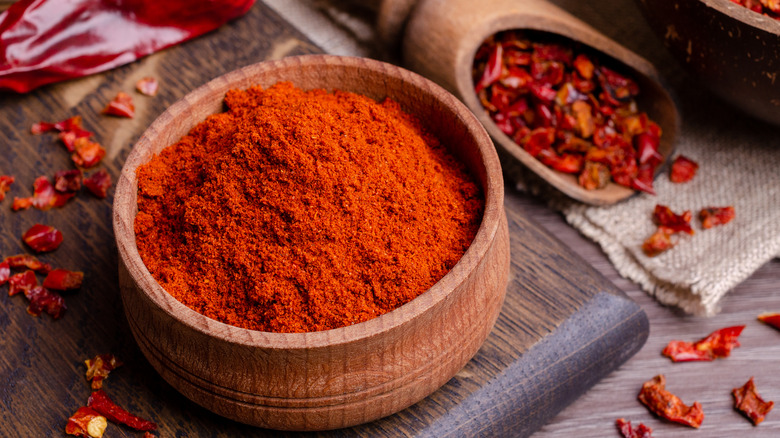15 Tips For Properly Seasoning Eggs
We'd be pretty confident in saying that eggs are the MVP of the kitchen, folks. A core ingredient in countless recipes, seriously satisfying, and utterly delicious, eggs are a vital dietary component worldwide — and in the United States, their popularity shows no signs of waning. In 2020, the average person in America ate a whopping 286.5 eggs, according to estimates provided by Statista, and that number is set only to rise.
And we can see why they've retained their high status in the kitchen for so long. In addition to all their other positive qualities, eggs are almost absurdly versatile, and their relatively neutral flavor lends itself to a host of different seasonings. It's important to remember that when it comes to seasonings, there's no need to stop at salt and pepper, with spice and herbs also serving to season dishes by imparting flavor (per Alimentarium). And with eggs, the sky's the limit — as long as you're seasoning them right. That's why we decided to put together our top tips on how to take your seasoning game to the next level with your eggs, to make sure you're enjoying every bite.
When adding salt, timing is crucial
Ask just about anyone to list the seasonings they routinely use, and salt will likely come up pretty fast. Salt is a central seasoning for a myriad of savory (as well as sweet) dishes, and no plate of scrambled eggs is complete without it. However, there's a right and wrong way to salt your scrambled eggs, to ensure that you're getting the most out of your dish. If you add salt after you've finished cooking your scrambled eggs, for instance, your seasoning can be uneven. To avoid this, add your salt when you're whisking them up.
Furthermore, allowing the salt to sit with your eggs for a little while before they go into your pan could create even tastier eggs (per Tasting Table). By leaving the eggs for roughly 15 minutes once seasoned, the salt can neutralize the negative charge in them, which then keeps moisture locked into them and makes your finished scrambled eggs even creamier. If you're only adding salt on top at the end, your eggs may become too tough and dry when you're cooking them.
Whisk your pepper for scrambled eggs
Eggs and pepper are a classic combo, with the pepper serving to add a delicate piquancy that brings egg dishes to life. But if adding it to scrambled eggs or omelets, it's important to employ the right strategy. Ensure that you're adding your pepper into your egg mixture before cooking — and crucially, make sure you whisk it in with ample force and speed (per Mashed). Not only does this help the eggs combine more completely, but it also stops your pepper from clumping up.
It's also worth thinking about the type of pepper you use. While ready-ground black pepper is a convenient choice, investing in a good pepper mill is the way to get serious flavor. Freshly milling pepper "frees their aromatics to evaporate, so the most and freshest flavor comes from whole peppercorns ground directly into the preparation," states food writer Harold McGee in "On Food and Cooking" (via The New York Times). Aim for a sturdy mill that allows you to adjust the fineness of the grind, as well as one that isn't too fiddly to refill.
A little garlic goes a long way
There's a reason why garlic takes such a central position in so many recipes: Simply put, it's really tasty. And in savory egg dishes, adding a small amount of garlic can help to level up your meal. Try throwing in 1 teaspoon of garlic powder for every portion of scrambled eggs you're making (assuming two eggs per person), to give your meal a new depth of flavor, states Mashed. You could even try adding some freshly chopped garlic into your eggs too, although bear in mind that this may result in a stronger, more pungent flavor.
And adding garlic may have more benefits than just a new, improved taste. Garlic can also pack a serious health punch, with the vegetable (as it is technically a vegetable) providing potential benefits for your immunity and your heart health (per the Cleveland Clinic). Bear in mind, though, that as registered dietitian Laura Jeffers explains, the health benefits of garlic start to become less impactful when it's cooked at a higher heat, so you may reap the most rewards by adding garlic in once your eggs are already partly cooked.
Balance your seasonings
Life is all about balance, and the same principle applies to food. When you're seasoning dishes like eggs, it's vital to ensure that you're not creating a flavor imbalance in your dish, which could lead to an unsatisfying meal. Successful flavor balances contrast elements like saltiness, fat, and heat against each other, as Nature's Path states, and simple things like adding a dash of milk to scrambled eggs can help to balance any chili or cayenne pepper you're putting in, creating a better, more well-rounded flavor profile.
One of the best ways to keep an eye on the seasoning balance in your meal is to taste it as you're cooking. While this can be trickier with scrambled eggs, trying a small amount when it's semi-cooked can help you quickly add other elements and redress the ratio of seasonings. Other egg dishes, like egg salad, should be tasted often when you're putting them together. If you've added too much vinegar or lemon juice, a touch of sugar or honey can reduce acidity. And remember, you can add all the trendy seasonings under the sun, but unless your food has adequate amounts of salt in it, it'll likely still taste underpowered.
Chives add freshness
Want a little zip in your dish without the sheer power of raw onion? That's where chives come in. This bright green sibling of onion and garlic gives your egg dishes a fresh taste and is a great accompanying flavor to a variety of egg-based meals. Chives are particularly good as a garnish on top of scrambled eggs, poached eggs, and eggs benedict, as Tasting Table states. As the flavor of chives is pretty subtle, don't be afraid to scatter it abundantly over your meal — it also pairs well with other herbs.
Alternatively, you can throw your chives into your scrambled eggs before you cook them, to better incorporate into the dish — but as food writer Bill Buford states, this can reduce their herbal punch (per The New Yorker). Instead, Buford adds them just before serving, sprinkled on top. It's also vital that you try and find the freshest herbs you can, to ensure maximum flavor, recommends pastry chef and "Le Livre de l'Oeuf" author Gaston Lenôtre.
Look out for especially fragrant chives, that have a green, vibrant hue.
Remember, take it slow
Modern living is all about getting things done fast. But as much as possible, try not to let that sense of urgency bleed into how you cook your eggs, and especially how you season them. A lot of egg dishes are thrown together in the kitchen without set measurements, and the size of your eggs can change the balance of a meal significantly. As such, it's important to season your egg dish gradually, adding your seasonings a little at a time, to avoid overwhelming the dish (and your tastebuds), suggests Sauder's Eggs.
This is particularly important if you're working with especially strong flavors, like hot sauce or raw garlic, as a little too much of something can tip the balance from delicious to dreadful. Try adding just a pinch of everything at first, and then taste just before serving, to see if you need more. Remember, many seasonings work as well as toppings as they do when incorporated into a dish, so don't be afraid to reserve a little salt and pepper to sprinkle over your eggs at the end — or invite your guests to season their eggs themselves. We guarantee they'll prefer that to enduring an over-salted plate of eggs.
Throw in hot sauce for a little spice
What's life without a little spice? We personally love a little heat in our food, and the creamy texture and flavor of eggs are the perfect vehicle for the piquancy that hot sauce provides. Hot sauce is particularly at home in breakfast egg dishes, to give your day a bit of a kickstart, explains Mashed.
And bear in mind, too, that while the defining trait of a hot sauce is usually the heat it brings to a meal (no prizes for figuring that one out, the clue's in the name), there is a range of milder hot sauces out there, which provide a complex flavor alongside a more gentle heat. Try out Melinda's Louisiana Red Cayenne Hot Sauce for a slightly milder feel that's especially compatible with scrambled eggs, or Yellowbird's Serrano green sauce for an earthier, sweeter taste (per Tasting Table). Remember, while you're at liberty to slather your hot sauce over your eggs once they're fully cooked — if you prefer a slightly drier dish — you might want to add the sauce in while you're cooking, according to Sauder's Eggs. The moisture in the hot sauce will evaporate as your eggs cook, and you'll end up with a slightly more concentrated flavor.
Add parsley for a herbal taste
A sprinkle of parsley is the final touch for a lot of meals, and if you have some in your fridge, it could be a great seasoning to add to your eggs. Parsley can impart a subtle, herbal flavor to dishes like scrambled eggs, working to underscore the savory tone of eggs without being too overpowering (per Mashed). And, unlike other herbs, preparing parsley to add to your dish is pretty simple: As the stem of the plant is edible, you can chop up the whole plant and use it all, although bear in mind that the stems have a slightly more bitter taste than the leaves, says Fiskars.
While it's entirely possible to add parsley during the cooking process, it's worth noting that as a fairly delicate herb, applying too much heat can not only diminish the flavor but reduce its visual impact. Instead, parsley is best used as a garnish on top of a finished plate of scrambled eggs or an omelet (per Foods Guy).
Wasabi can provide a unique heat
While you may be well-versed in adding salt and pepper to your eggs, sometimes it pays off to think outside of the box. And that's where wasabi comes in. A cousin of mustard and horseradish, wasabi is a staple in Japanese cuisine and delivers a distinct heat that largely impacts the sinuses, unlike the heat from chili peppers, which activates the pain receptors in your mouth via their capsaicin.
This unique sensation can make your egg dish both unique and flavorful. Wasabi paste is particularly at home in deviled eggs as a slightly fiercer substitute for mustard, with the mayonnaise used to make the snack helping to neuter the heat somewhat, according to Tasting Table. Mixing a dollop of wasabi into your scrambled eggs can also create a sinus-tingling breakfast that'll be guaranteed to wake you up in the morning (per Mashed). Bear in mind that eating even slightly too much wasabi can create some serious discomfort as the spice hits your nasal passage — so make sure you're adding it in small amounts, tasting as you go.
For fried eggs, season with paprika
Created by finely milling dried sweet peppers into a spice blend (per BBC Good Food), paprika is a key ingredient in a variety of savory dishes. And if you're making fried eggs, it could take your breakfast to the next level. Rather than just frying your eggs in regular oil, add in a few pinches of smoked paprika before you crack your eggs in, which then cooks in the oil and gives the eggs an additional savory kick (per Mashed). Paprika also works as a garnish, and you can also dust some of the spice over your fried eggs once you've served them up, or sprinkle them over deviled eggs for a pop of color.
Know that your choice of paprika can affect the final flavor of your eggs significantly. Paprika not only varies in the heat but in the kind of taste it imparts, as MasterClass notes. Sweet paprika will have a gentler flavor and will usually be lighter on spice, whereas smoked paprika is generally hotter, and due to the slow-roasting process that the peppers undergo, has a charred, complex taste, making it better-suited for those who like their meals to be a little bolder.
For a hint of luxury, add truffles
Truffles supply a truly unique flavor that's often used to give dishes a hint of indulgence. But there's no reason why you can't use them in your everyday egg dishes too. Truffles are a natural pair for egg-based meals, as well as meals that contain dairy or cheese, as Good Food notes. They go especially well with scrambled eggs, and the best part is, a little goes a long way, according to Nigel Wood, Truffle Melbourne Festival director. "You don't need to buy a kilogram of truffle; you can buy 40 grams and have a great dinner party and enough truffle left over for your scrambled eggs in the morning," he says. We like the sound of that!
One of the reasons why truffles go so well with eggs is due to their higher fat content, which heightens the truffle aroma and gives it something to hang onto, explains The English Truffle Company. Cooking with truffles is somewhat of a delicate art, and blasting them with too much heat can reduce the flavor and scent of the truffle significantly. It's for this reason that you should add them to your meal just before you plate up. If you're buying fresh truffles, make sure you're using them relatively quickly — the longer you keep them, the less flavorful they'll be.
Level up your eggs with pesto
You might be used to pesto in your weekly pasta dinner, but have you ever used it in eggs? If not, we suggest you give it a go. With its roots in Ancient Roman culture, pesto can be made with everything from a classic basil blend to arugula and even tomatoes (per Mashed) — all of these give your eggs significant bang for your flavor buck.
One of the best things about using pesto to season eggs is the sauce's versatility and compatibility with pretty much every egg dish out there. Folding pesto into your scrambled eggs, spooning a dollop on top of a fried egg, putting it into an omelet, and spreading it onto bread to make an egg and pesto sandwich are all viable and tasty options (per Sauder's Eggs). They're also a great addition to deviled eggs. Simply throw a few spoonfuls of pesto mixture into your egg yolks along with your other ingredients, and pipe them into the egg whites, for a twist on this classic cocktail party snack.
Sprinkle za'atar on top
Adding za'atar may not be your first thought when it comes to jazzing up your eggs, but if you want to put a fresh twist on your morning meal, it's a great addition. Za'atar is a spice blend that's frequently used in dishes originating in the Middle East, and it can be comprised of a variety of different spices and herbs, although usually contains fried herbs and sesame seeds, explains BBC Good Food. Za'atar can also contain sumac, a spice created by grinding crimson berries and which gives food a citrusy taste. Sumac-containing za'atar provides a particularly good accompaniment to fried eggs when sprinkled on top.
It's worth bearing in mind that as za'atar blends can vary from brand to brand, it might take a little trial and error until you find the perfect one. That's why it's usually a good idea to buy it in smaller batches, and if you're not used to the flavors of the spice blend, start with just adding a little amount to your food and working your way up. Remember, herbs branded as "za'atar" may just be a single herb, like thyme or oregano, so make sure you're checking the label before you buy (BBC Good Food).
Curry powder can bring a depth of flavor
Curry powder isn't just for curries. The spice mix, which commonly contains a wealth of spices like cumin, coriander, turmeric, and chili powder (per WebMD), can be used to imbue a range of meals with layers of flavor, including eggs. Try adding a few pinches to your scrambled eggs while whisking, to give your breakfast a little kick. Be aware that a lot of curry powders that come ready-made in the supermarket contain salt, notes Seasoned Pioneers. As such, ensure that you account for this by reducing the salt you add elsewhere.
Additionally, it's important not to confuse curry powder and curry paste. Although they're different textures, it can be tempting to use them in the same manner — but crucially, curry paste can have significantly more heat than some curry powder blends, meaning that you may end up with a dish that's spicier than expected (per Spiceography). As curry paste will also add additional moisture to your dish, we'd recommend saving it for dishes like curries or soups, and only using curry powder when you're looking to spice up your eggs.
If you like heat, cayenne pepper is your friend
A range of seasonings can add heat to eggs, from hot sauce to horseradish — but if you're looking for a hit of pure fire, you can't go wrong with cayenne pepper. With its unparalleled heat, cayenne pepper is for those who find seasonings like black pepper or curry powder a little mild, and adding a few dashes to scrambled eggs can spice things up considerably, Spiceography explains.
Cayenne pepper provides heat through its capsaicin content, a compound in the spice that stimulates the receptors in the mouth to give you that spicy sensation (per WebMD). Aside from giving your food a kick, capsaicin also has some notable potential health effects, with some studies demonstrating that capsaicin has a positive effect on blood pressure, as well as helping to keep your digestion healthy.
As a further bonus, adding cayenne pepper to your eggs keeps them drier than other seasonings can, as additions like hot sauce may increase the moisture level of your dish. Hot sauce can also have higher levels of vinegar or other acids which may alter the flavor profile of the eggs.
